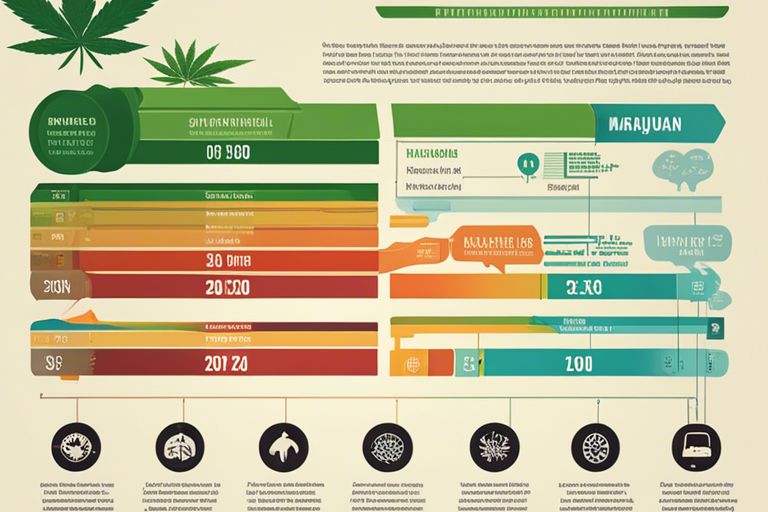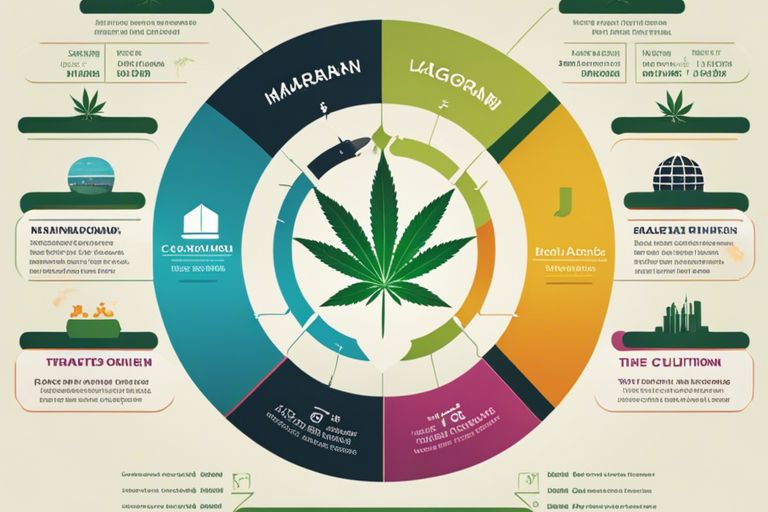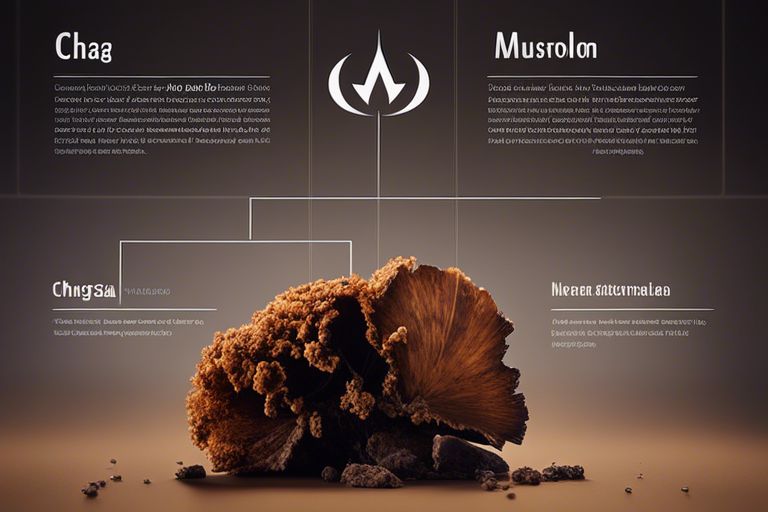The Rise Of Recreational Marijuana
Many states have legalized recreational marijuana in recent years, leading to a surge in popularity and availability. In this guide, I will walk you through everything you need to know about the rise of recreational marijuana, including the benefits, risks, laws, and consumption methods. Whether you’re a seasoned user curious about the changing landscape or a newcomer exploring your options, this comprehensive guide will help you navigate the world of recreational marijuana with confidence.
Key Takeaways:
- Growing industry: The recreational marijuana industry is rapidly expanding, offering numerous opportunities for investors, entrepreneurs, and consumers.
- Legal landscape: Laws and regulations on recreational marijuana vary by state and country, making it crucial to stay informed on the latest legal developments.
- Health and social implications: While recreational marijuana can provide benefits for some individuals, it is important to consider the potential health risks and societal impacts associated with its use.
History of Marijuana Legalization
Your journey into understanding the history of marijuana legalization begins here. For a detailed guide to the current state of marijuana legality, check out Where Is Marijuana Legal? A Guide to …
Early Beginnings
Beginnings of marijuana legalization can be traced back to early civilizations, where the plant was used for medicinal and recreational purposes. As time progressed, societal attitudes towards marijuana evolved, leading to both its demonization and eventual acceptance in various cultures.
Landmark Events and Legislation
Beginnings to the rise of recreational marijuana can be attributed to landmark events and legislations. For instance, the legalization of recreational marijuana in Colorado and Washington in 2012 marked a significant shift in the landscape of drug policy. The move sparked debates across the nation, with proponents citing economic benefits and social justice while opponents raised concerns about public health and safety.
Types of Recreational Marijuana
There’s a wide variety of recreational marijuana products available in the market today. To help you understand better, I have categorized them into three main types: flower and buds, edibles and concentrates, and topicals and tinctures. Each type has its unique characteristics and effects, catering to different preferences and needs.
| Flower and Buds | These are the most common form of marijuana, usually smoked or vaporized for immediate effects. |
| Edibles and Concentrates | These products offer a more discreet way of consuming marijuana, with longer-lasting effects. |
| Topicals and Tinctures | These are applied externally and are popular for localized pain relief without the psychoactive effects. |
Though the availability of these products may vary depending on your location, it’s imperative to understand the different types to make an informed choice. For detailed information on the Federal Status of Marijuana and the Policy Gap with States, you can refer to the official document.
Flower and Buds
Even though smoking or vaping flower and buds provides a quicker onset of effects, it’s imperative to start with a low dose if you are a beginner to avoid any unpleasant experiences.
Edibles and Concentrates
Assuming you are familiar with edibles and concentrates, it’s crucial to be aware of the delayed onset of effects to prevent unintentional overconsumption. Start with a small dose and wait for the effects to kick in before taking more.
With various consumption methods and products available, it’s imperative to understand your tolerance levels and the potency of the product you are using. Experimenting with different types of marijuana products can help you find the right balance for your recreational experience.
Topicals and Tinctures
Types of topicals and tinctures offer localized relief from pain, inflammation, and skin conditions, making them a preferred choice for users looking for therapeutic benefits without the euphoric effects.
Concentrates in these products can be potent, so it’s crucial to follow the recommended dosage and consult with a healthcare provider if you are unsure about using them. Topicals and tinctures provide a convenient and discreet way to experience the benefits of marijuana without the need for inhalation.
Factors Contributing to the Rise of Recreational Marijuana
Many factors have played a role in the increased acceptance and legalization of recreational marijuana. These include changing public perception, economic benefits and job creation, as well as a shift in law enforcement priorities. After years of stigma and prohibition, we are now witnessing a significant shift towards the normalization of marijuana use.
Changing Public Perception
On the front of changing public opinion stands a growing awareness of the medical benefits of marijuana, as well as a recognition of its potential for recreational use. The stigma attached to marijuana consumption is diminishing, as more people educate themselves about the plant’s properties and its positive impacts.
Economic Benefits and Job Creation
To address the economic benefits of recreational marijuana legalization, it is worth noting that the industry has created numerous new jobs and revenue streams. In states where marijuana is legal, there has been a surge in tourism and innovation related to the cannabis industry.
Factors contributing to the rise of recreational marijuana include a shift in law enforcement priorities.
Shift in Law Enforcement Priorities
Benefits of the shift in law enforcement priorities include a reduction in marijuana-related arrests and a focus on more serious crimes. With legalization, police resources can be better allocated to addressing violent offenses and protecting communities.
In summation, the perception of marijuana is evolving, driven by scientific research and economic interests. The rise of recreational marijuana is reshaping social attitudes and government policies.
Understanding Marijuana Laws and Regulations
Federal vs. State Laws
Now, let me explain the key difference between federal and state laws concerning marijuana. While some states have legalized recreational use, marijuana is still illegal at the federal level in the United States.
Age Restrictions and Purchase Limits
To address age restrictions and purchase limits, many states require individuals to be at least 21 years old to purchase marijuana products. Additionally, there are often limits on how much marijuana you can buy in one transaction.
With age restrictions, it’s crucial to have a valid ID to prove your age when purchasing marijuana products. Some states also have restrictions on the types of products you can purchase based on your age.
Implications for Tourists and Travelers
Restrictions on tourists and travelers vary from state to state. Some states allow out-of-state visitors to purchase and consume marijuana, while others restrict access to only residents.
For instance, in some states, tourists may face challenges finding places to legally consume marijuana, as public consumption is often prohibited. It’s crucial to research the laws and regulations of the specific state you plan to visit to ensure compliance.
Pros of Recreational Marijuana
Health Benefits and Medical Uses
Despite some controversy, recreational marijuana has been found to offer various health benefits and medical uses. Any individual suffering from chronic pain, anxiety, or insomnia may find relief through the use of marijuana. Additionally, research has shown that marijuana can help with nausea and stimulate appetite, making it beneficial for cancer patients undergoing treatment.
Increased Tax Revenue and Economic Growth
Some states have legalized recreational marijuana in order to capitalize on the increased tax revenue and stimulate economic growth. By legalizing and regulating the sale of marijuana, states are able to generate significant tax income which can be used to fund various public services and initiatives.
Reduced Crime Rates and Law Enforcement Burden
Burden on law enforcement agencies is reduced when marijuana is legalized for recreational use. By legalizing marijuana, police can focus on more serious crimes, and the justice system is not bogged down with non-violent marijuana offenders. This leads to a decrease in overall crime rates and a more efficient allocation of resources.
Cons of Recreational Marijuana
Potential Health Risks and Addiction
Keep in mind that while recreational marijuana can be enjoyable, there are potential health risks and the possibility of addiction. Regular use of marijuana can lead to respiratory issues, decreased memory and cognitive function, and an increased risk of psychosis in vulnerable individuals.
Impaired Driving and Public Safety Concerns
Recreational marijuana use can impair judgment, coordination, and reaction time, making driving dangerous. Public safety concerns arise as individuals under the influence may put themselves and others at risk on the roads.
Recreational marijuana use can lead to an increase in accidents and fatalities on the roads. It is important to note that driving under the influence of marijuana is illegal and can have severe consequences for individuals and innocent bystanders.
Negative Impact on Youth and Vulnerable Populations
Clearly, the use of recreational marijuana can have a negative impact on youth and vulnerable populations. Youth are particularly susceptible to the harmful effects of marijuana on brain development, leading to impaired cognitive function and increased risk of mental health disorders.
The availability of recreational marijuana can also lead to increased use among vulnerable populations, such as those struggling with addiction or mental health issues. It is crucial to consider the potential consequences of widespread access to marijuana on these individuals.
Step-by-Step Guide to Buying Recreational Marijuana
For this chapter, I will be providing a comprehensive guide on the steps to follow when purchasing recreational marijuana. The process involves finding a dispensary, verifying your ID, understanding product labels and potency, and tips for first-time buyers and responsible use.
Finding a Dispensary and Verifying ID
| Finding a Dispensary | Verifying ID |
To start your journey into purchasing recreational marijuana, you will need to find a licensed dispensary in your area. Once you locate a dispensary, you will need to verify your ID to ensure you meet the legal age requirements.
Understanding Product Labels and Potency
| Product Labels | Potency |
Product labels on recreational marijuana products provide crucial information such as THC and CBD content, serving size, and strain type. Understanding these labels will help you make informed choices based on your tolerance level and desired effects.
Verifying the potency of the product is necessary for responsible consumption. Always start with a small amount and wait to feel the effects before consuming more.
Tips for First-Time Buyers and Responsible Use
| Tips for First-Time Buyers | Responsible Use |
Dispensary staff can provide valuable guidance on product selection and usage. It’s important to start with low doses, especially if you are new to marijuana.
- Ask questions about the products and their effects.
- Start with a low THC content to avoid overwhelming effects.
- Store your products safely away from pets and children.
Knowing your limits and consuming responsibly are key to enjoying recreational marijuana without negative consequences.Tips for Responsible Marijuana Use
To enjoy marijuana responsibly, there are some guidelines you should follow:
- Start low and go slow: Begin with a small dose and wait to feel the effects before consuming more.
- Know your limits: Understanding how marijuana affects you personally is crucial in avoiding overconsumption.
- Avoid combining with alcohol or other substances: Mixing marijuana with other drugs can increase the risks and effects.
- Never drive under the influence: It’s illegal and dangerous to operate a vehicle while impaired.
After indulging responsibly, you can fully enjoy the benefits of marijuana without any negative consequences.
Dosage and Potency Guidelines
Some key points to keep in mind for dosage and potency when using marijuana:
Safe Storage and Disposal Methods
Some important tips for safely storing and disposing of marijuana products:
It’s vital to keep marijuana products out of reach of children and pets. Store them in a cool, dry place away from direct sunlight and in a child-proof container. When disposing of unused or expired products, make sure to follow local regulations and guidelines to ensure environmental safety.
Avoiding Impaired Driving and Public Intoxication
Some crucial reminders to prevent impaired driving and public intoxication:
Another vital factor to consider is the impact of marijuana on your judgment and coordination. Be mindful of your surroundings and make responsible decisions to avoid any risks to yourself and others.
The Role of Dispensaries and Budtenders
What to Expect from a Dispensary Visit
All dispensary visits are regulated to ensure a safe experience. You can expect to be asked for identification to verify your age and be in a secure environment where all products are labeled with detailed information about THC and CBD content.
How Budtenders Can Help You Make Informed Choices
Expect the budtender to have in-depth knowledge about different strains, consumption methods, and effects. They can guide you to products that match your preferences and experience level.
A budtender will ask you about your experience level with cannabis, what effects you are looking to achieve, and any preferences you have for consumption methods. By understanding your needs and educating you on the available products, they can help you make an informed decision.
Building a Relationship with Your Dispensary
To build a relationship with your dispensary, visit regularly, ask questions, and provide feedback. By developing a rapport with the staff, you can receive personalized recommendations and stay updated on new products and promotions.
Dispensary staff can also keep you informed about any changes in regulations or best practices, ensuring you have the most up-to-date information to make responsible choices regarding your cannabis consumption.
Marijuana and Food: A Guide to Edibles and Cooking
Understanding Edible Effects and Dosage
Unlike smoking marijuana, edibles take longer to kick in and can have more potent effects. Clearly understanding the dosage is crucial to avoid overconsumption and unpleasant experiences.
Cooking with Marijuana: Tips and Recipes
Guide to cooking with marijuana includes tips for infusing cannabis into butter or oil, along with recipes for edibles like brownies and gummies. Any novice can create delicious infused dishes with these easy-to-follow recipes.
Marijuana
Avoiding Overconsumption and Unpleasant Experiences
Unpleasant experiences from edibles can be avoided by starting with a low dosage, being patient, and understanding how your body reacts to THC. Plus, storing edibles safely away from children and pets is crucial.
Marijuana and Travel: What You Need to Know
Once again, marijuana laws vary greatly across the United States, and it’s crucial to understand the regulations before incorporating marijuana into your travel plans. Whether you’re considering a road trip, a flight, or simply exploring a new city, being well-informed can make all the difference in ensuring a smooth and enjoyable experience.
Marijuana Laws Across the US
While some states have legalized marijuana for recreational use, others still enforce strict prohibition. It’s important to research and familiarize yourself with the laws of the specific states you plan to visit to avoid any potential legal issues. Not complying with local regulations can result in fines, legal trouble, or even imprisonment.
Traveling with Marijuana: Risks and Considerations
Marijuana possession is still illegal at the federal level in the United States, regardless of individual state laws. It’s vital to understand that traveling with marijuana, especially across state lines or internationally, can carry severe consequences. Your best bet is to consume marijuana in a legal and safe environment to avoid any legal risks.
For instance, crossing state lines with marijuana, even between two legal states, can result in federal charges as you are subject to federal law once you enter the jurisdiction of the United States as a whole.
Finding Marijuana-Friendly Accommodations and Activities
Clearly, as marijuana becomes more widely accepted, so do marijuana-friendly accommodations and activities. Many hotels, Airbnb rentals, and tour companies now cater to cannabis enthusiasts. However, be sure to verify the policies and regulations of these establishments before partaking in any marijuana-related activities to avoid any misunderstandings or conflicts.
Marijuana-friendly accommodations and activities can enhance your travel experience by providing a safe and welcoming environment for you to enjoy marijuana responsibly. Some establishments even offer guided tours of local dispensaries or cannabis-infused culinary experiences, allowing you to immerse yourself in the culture of recreational marijuana.
The Future of Recreational Marijuana
Not long ago, the idea of recreational marijuana being legal seemed like a distant dream. However, with changing attitudes and laws, the future of recreational marijuana is brighter than ever. To learn more, check out The WIRED Guide to Cannabis.
Emerging Trends and Technologies
Even as recreational marijuana becomes more widely accepted, new trends and technologies are constantly emerging in the industry. From innovative consumption methods to advanced cultivation practices, the landscape of recreational marijuana is evolving rapidly.
Expanding Legalization Efforts and Advocacy
Legalization efforts and advocacy for recreational marijuana are gaining momentum across the country. With more states legalizing cannabis for adult recreational use, advocates are working tirelessly to promote education and awareness about the benefits of marijuana.
Overcoming Stigmas and Stereotypes
Efforts to overcome stigmas and stereotypes surrounding recreational marijuana are crucial for the industry’s continued growth. By challenging misconceptions and promoting positive narratives, we can help change public perception and create a more inclusive space for all cannabis enthusiasts.
Stigma Stereotype Associated with laziness Viewed as a gateway drug Seen as harmful to health Only used for recreational purposes Connection to criminal activity Targeted towards a specific demographic Considered taboo in social settings Perceived as a sign of irresponsibility Linked to memory and cognitive impairments Associated with lack of motivation Addressing Common Concerns and Misconceptions
Debunking Marijuana Myths and Stereotypes
After the legalization of recreational marijuana, many myths and stereotypes have surrounded its use. It’s crucial to separate fact from fiction to make informed decisions. Some common misconceptions include the belief that marijuana is a gateway drug, that it leads to addiction, or that it causes violent behavior. The reality is that marijuana can be used responsibly, and its effects vary from person to person. Any concerns about its use should be addressed with accurate information.
Marijuana is a gateway drug Marijuana can lead to addiction Marijuana causes violent behavior Marijuana impairs cognitive function permanently Marijuana is equally harmful as other illicit drugs Marijuana use leads to decreased productivity Addressing Parental and Employer Concerns
An important aspect of the legalization of recreational marijuana is how it affects parents and employers. Misconceptions about marijuana use can lead to concerns about its impact on family life and productivity in the workplace. It’s vital to have open conversations and provide education on the responsible use of marijuana. Any concerns about safety and performance should be addressed promptly.
Marijuana and Mental Health: Separating Fact from Fiction
Fiction. There is a lot of misinformation surrounding marijuana use and its impact on mental health. Some believe that marijuana worsens conditions like anxiety and depression, while others claim it can help alleviate symptoms. Plus, it’s important to note that while marijuana can have adverse effects on mental health for some individuals, for others, it may provide relief from symptoms. Any concerns about marijuana and mental health should be discussed with a healthcare professional.
Final Words
Now that you have completed this comprehensive guide on the rise of recreational marijuana, I hope you have gained valuable insights into this evolving industry. Keep in mind, legalization brings both opportunities and challenges. Whether you are a consumer, investor, or policymaker, staying informed and educated is crucial as this industry continues to grow and shape the future of cannabis consumption.
FAQ
Q: What is recreational marijuana?
A: Recreational marijuana refers to the use of cannabis for non-medical purposes, typically for enjoyment or relaxation.
Q: Is recreational marijuana legal in all states?
A: No, recreational marijuana is not legal in all states. As of now, it is legal for recreational use in several states, while others have only legalized it for medical purposes.
Q: How can I consume recreational marijuana?
A: Recreational marijuana can be consumed in various ways, including smoking, vaping, edibles, tinctures, and topicals.
Q: What are the potential health risks of using recreational marijuana?
A: While recreational marijuana is generally considered safe for adult use, there are potential risks, such as impaired coordination, increased heart rate, and dependence or addiction with excessive use.
Q: Can I travel with recreational marijuana?
A: It is important to note that federal law prohibits traveling across state lines with marijuana, even if it’s legal in the destination state. It’s advisable to consume it within the state where it is legally allowed.









